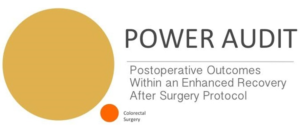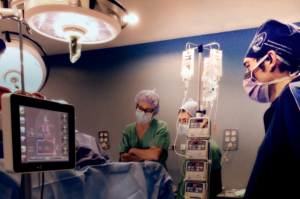It’s that time again! We have been receiving continuous applications for the Castor Research Award and already realize how difficult it will be to select the winner at the end of this year!
The third nomination is a large observational multicenter study initiated from Spain, investigating the postoperative outcomes of lower gastrointestinal surgery using an enhanced recovery protocol. We hope the results of this POWER study are “powerful” enough to be implemented into clinical practice guidelines!

Postoperative Outcomes within an Enhanced Recovery After Surgery (POWER)
Study Type: Observational
Study Design: Prospective, Multicenter, Cohort
Initiator: Infanta Leonor University Hospital, Madrid, Spain: Javier Ripollés-Melchor (MD) and “Grupo Español de Rehabilitación Multimodal (GERM)/ Enhanced Recovery After Surgery Spain Chapter”: J. Ramírez (MD, PhD)
Register: ClinicalTrials.gov identifier: NCT03012802
Website: www.grupogerm.es/power
Research summary
The POWER study is a multicenter, Spanish, prospective, observational cohort study lead by Javier Ripollés-Melchor of the Infanta Leonor University Hospital in Madrid, Spain. The study, endorsed by the GERM/ERAS Spain Chapter (Grupo Español de Rehabilitación Multimodal (GERM)/ Enhanced Recovery After Surgery Spain Chapter), is investigating the incidence of 30-day predefined (according to EPCO guidelines) postoperative complications following elective lower gastrointestinal surgery within any compliance of an enhanced recovery after surgery (ERAS) protocol, during a period of 2 consecutive months, in each of the 80 participating centers.

The primary objective of the study is to better understand what type of postoperative complications occur in these patients, the peri-operative factors that influence their development and the associated outcomes such as mortality or length of hospital stay.
On the other hand, we want to investigate the influence of the application of the ERAS protocols, by default or not predetermined, and the effect of the volume of patients undergoing surgery per center. The results obtained from this study may be incorporated into clinical practice guidelines; they would also serve as a solid base for the development of new research in this field.
The original POWER study is expected to be published this summer-autumn; we also hope to publish 4 sub-studies that we plan ad-hoc.
This study has been a success, anesthesiologists and surgeons have worked together with effort and perseverance. Due to the enormous possibilities that we have found during these studies, we are now planning to carry out a similar study at European level, in which we hope to achieve high participation rates.
How we are using Castor for our research
The team has been using Castor EDC for their electronic data collection, having selected it for its user-friendliness, affordability and scalability. We have currently recruited 2000 patients. And we will soon have all the data entered in Castor.
This study has not received any funding, so without Castor “help”, it would have been impossible to carry it out. On the other hand, no researcher had any doubt about the functioning of the platform; with more than 150 researchers entering data, it has greatly facilitated things for us.
As principal investigator, data manager, and monitor, Castor has allowed me to know in real time the advances in the study; as well as check the progress of the included patients. All the doubts I had before starting the study were kindly resolved by the Castor team.
Stay tuned for more nominations! We wish all nominees good luck and encourage all researchers to brag about their projects and get the chance to win €3000!


